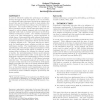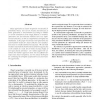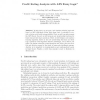388 search results - page 27 / 78 » The SDA Model: A Set Theory Approach |
ATAL
2009
Springer
13 years 6 months ago
2009
Springer
Today's society is largely connected and many real life applications lend themselves to be modeled as multi-agent systems. Although such systems as well as their models are d...
WOSP
2005
ACM
14 years 2 months ago
2005
ACM
In order to effectively validate the performance of software systems throughout their development cycle it is necessary to continuously build performance models from software mod...
JOLLI
2002
13 years 8 months ago
2002
Temporal logic can be used to describe processes: their behaviour is characterized by a set of temporal models axiomatized by a temporal theory. Two types of models are most often ...
CVPR
2005
IEEE
14 years 10 months ago
2005
IEEE
Many approaches to object recognition are founded on probability theory, and can be broadly characterized as either generative or discriminative according to whether or not the di...
ICNC
2005
Springer
14 years 2 months ago
2005
Springer
In this paper, we propose a new machine learning approach based on AFS (Axiomatic Fuzzy Sets) fuzzy logic, in attempt to provide a better model with interpretability. First, we wil...



